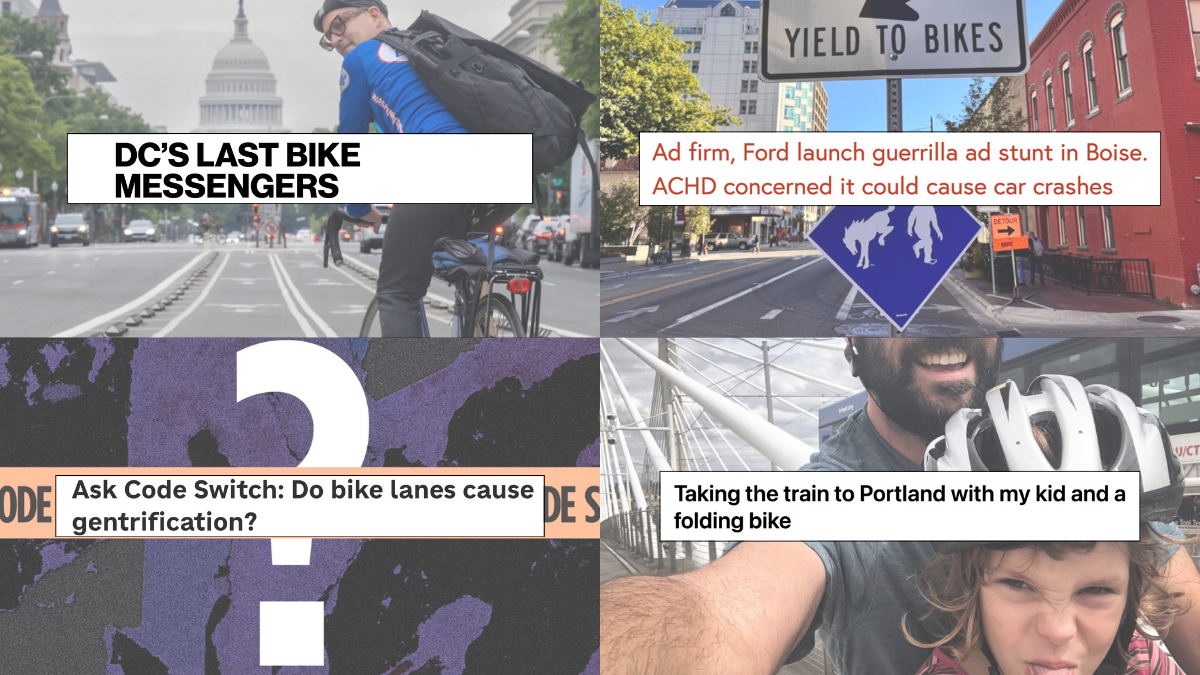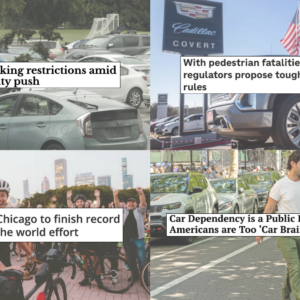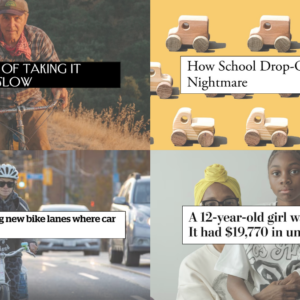Hello everyone. I would say “happy Monday,” but that would be a lie. My mind and body are full with thoughts of devastation. Devastation to people and the planet — and the devastating reality that the U.S. government is complicit in so much of it. What can BikePortland do? I will keep the fire burning here as always, so that we have a platform to help push important conversations forward. Please reach out to me if you have ideas on how we can best use this platform to bring attention to important global issues.
For now, here’s our weekly roundup of the most notable stories from around the web that I’ve come across and that folks have shared with me in the past seven days…
Homage to messengers: An amazing look into the past and present of cycle couriers in Washington D.C. that likely tracks the experience of many major U.S. cities over the past two decades and how deliveries by bike have dwindled. (Washingtonian)
Don’t drive, maybe? Today is the first day of a growing, national, “Week Without Driving” movement. The idea is just what it sounds like: Don’t drive for a week and see what happens. You in? (Week Without Driving)
Bike blogger in Portland: My Seattle compatriot Tom Fucoloro visited Portland recently via train and folding bike and shared thoughts on the quality (or lack thereof) of our network. (Seattle Bike Blog)
Little change on climate goals: In a city where public safety and homelessness dominate politics, it’s not surprising that our climate change “emergency” plan is languishing. Even so, the lack of progress is very concerning. (Portland Mercury)
Irresponsible advertising: Someone at the major ad agency Wieden and Kennedy thought it’d be a good idea to post signs along major streets encouraging people to text. The worst part is the campaign gives one lucky winner a free SUV. The City of Boise was like, “WTH?” (BoiseDev)
It’s complicated: The question of whether or not bike lanes cause gentrification was re-litigated by a national podcast this past week. It’s worth a listen, especially if you weren’t around Portland in 2010-2013 when we went through the N Williams Avenue project saga. (NPR Code Switch)
World Champs: Slovenian superstar cyclist Tadej Pogačar pulled off the very rare Triple Crown and has now won the Giro, the Tour, and the World Championships all in one year! Belgium’s Lotte Kopecky won Worlds on the women’s side. (Bicycling)
Thanks to everyone who sent in links this week. The Monday Roundup is a community effort, so please feel free to send us any great stories you come across.








Thanks for reading.
BikePortland has served this community with independent community journalism since 2005. We rely on subscriptions from readers like you to survive. Your financial support is vital in keeping this valuable resource alive and well.
Please subscribe today to strengthen and expand our work.
Sheesh, everyone knows that it was Australian Shepherds, followed by Golden Retrievers, and then Corgi’s that were responsible for gentrification in Portland.
New wave displacement is all about Labradoodles.
Portland’s Climate action “plan” has always been greenwashing fantasy and the declaration of climate emergency was a complete farce from day one. Pretty legislative language with no concrete timeline, no funding, and no political mandate is not in any way acknowledgement of an “emergency”.
I know it’s wicked but I’m so angry at the “galaxy brain” cognitive dissonance from liberals/progressive over their window-dressing climate emergency declarations that I look forward to their ululations and gnashing of teeth over Portland’s farcical lack of progress.
What the ***k did you think was going to happen when you keep on electing corporate-fascist democrats who illegally make back-room deals with big oil, claim that burning toxic and ecocidal diesel or methane could possibly be “renewable”, use RECs (a mega-corp and wall street invention) as a fictitious surrogate for genuine renewable energy generation, coddle utilities owned by sociopathic billionaires or wall street investors instead of creating a public utility, refuse to meaningfully address the fracked gas that so many Portland residents and businesses burn like there is no 2040, limit increased density to ultra-low density ADUs and plexes, refuse to mandate electrification of affluent people’s homes (they can afford it, so mandate it), and who pretend that a city whose population is ever more affluent does not pump out toxic and ecocidal emissions via its pathological hyperconsumption.
Thanks for the comment.
One of many things I find interesting in political discourse these days is how the policies passed by government are then assigned with a broad brush to “liberals/progressives” (or any other general political label which has little meaning because labels lack the nuance required to solve big problems) as if regular, everyday voters are the ones who craft these plans and are enthusiastic fans of the plans!?
Who do you think you are speaking to with comments like this? The way I see it, the only people who are excited about “emergency” plans like this are city staff, elected officials, and the top folks at the many various advocacy group “partners” who were involved in and/or paid with city contracts in some way to help get the plans passed and/or who are more worried about losing access to power they become it.
The vast vast majority of people are just as mad about the lack of progress and performative politics as you are! But it feels like to me that instead of point your anger at government and the power class that is responsible for these plans and whether we make progress on them, you get mad at this false bogeyman of the people. Then you share a list of things you are bothered by that are things you need a massive groundswell of these same people to organize and rally with to help change.
Have you ever considered that one reason we’re in so much shit right now is that there is an unfortunate tendency of everyday, regular people and activists to blame each other when things go badly… instead of working together and organizing with allies in a big coalition to defeat/change what the government and those in power are doing?
Our voting system hardly gives people much choice. So this idea that there’s some huge group of people who, “keep on electing corporate-fascist democrats” and that somehow these folks are happy with what’s going on and/or are to blame for what’s going on feels like you’re creating an enemy that doesn’t exist just to push your personal narrative and scapegoat these complicated problems instead of looking in the mirror and acknowledging that many of us want the same things and there’s an immense amount of community and political organizing required to change onto a new course.
This is true at the presidential level, where the electoral college makes my vote utterly meaningless, but less so locally. Anyone with sufficient support can get elected.
The real limitation is that too many voters don’t spend the time to really think about who they’re voting for, so known names (such as incumbents) and endorsements can really sway the results. (This will be equally if not more true under the new system than the old.)
So the basic question I’m able to distill from your post and the parent are who is to blame for our lack of progress in tackling climate change — our leaders or those who elect them?
I am convinced that if the electorate really cares about an issue, that will be reflected in who we elect. Portlanders really care about cleaning up the streets at the moment, and that’s going to be the defining issue of the election (and is the cornerstone of the Gonzalez and Wilson campaigns among others). If voters cared just as passionately about, say, electrifying city vehicles, that’s what candidates would be talking about.
My conclusion is that responsibility essentially flows back to the voters, with the caveat that you can only vote for one of the people who actually steps forward (and may imperfectly match your views). It is also my belief (but have no evidence to back it up) that only a tiny minority of residents make the effort to communicate what they want to their leaders.
How many of us can honestly say we’re going to vote for people based on the strength of their climate change proposals above all else? (Or bike/traffic safety issues above all else?) I think most people are going to vote for someone based on their general vibe, and hope for the best.
I agree with a lot of your comment Watts. Thanks for sharing. My point is just that I feel blaming voters and “liberals/progressives” or any such label is just too simplistic and that I see a lot of folks expressing their anger/anxiety by attacking other voters instead of the power structure which I believe is where more of the blame lies. All this being said, I also do blame many voters for a similar reason I think you hint at — they don’t take enough time and/or do the requisite work of democracy by being informed and taking their votes very seriously.
Of course it is. My reading is that this particular assignment of blame is an intentional way to get folks reading this blog to look in the mirror and understand they are part of the problem. He’s saying that thinking correct thoughts is not a substitute for action, which, if concerted, would open a new route around those power structures.
point taken.
That was exactly my intent.
That’s the nice thing about RCV in the council race, Watts – I can vote for people on the strength of their climate change message vs. worries about ‘electability,’ and have a decent chance the candidate wins a spot.
Mayor tho, is one shot. Caveat emptor.
BTW – DO NOT rank a candidate you hate AT ALL, not even ranked last to show your contempt. They could actually end up the winner. SWHRL hosted an RCV event last Saturday, and that was one of the big takeaways. Rank who you WANT to win in order of preference, and put the ballot in the envelope…
Until a critical mass does this, it won’t matter, because your climate picks will be eliminated early in favor of “brand name” candidates who got the plum endorsements. The problem Jonathan articulated remains:
Maybe the original principle of the electoral college isn’t so bad after all: the public votes for a group of people who will study the issues closely and then they will elect a candidate.
On the mechanics side of things, if the mayoral race (for example) comes down to the two predicted candidates, as long as I ranked my preferred choice above my lesser preferred choice; it won’t matter at all who gets ranked below the winner.
But if you rank your LEAST preferred candidate at all, they have a shot at winning. Watched it all gamed out by a person who helped build the process.
DON’T write in people you want to lose, period.
TL;DR: What you are saying seems to boil down to: don’t rank someone you dislike at the expense of someone you feel neutral about… yeah, of course.
You rank candidates in order of preference. When you’ve run out of candidates you prefer over others, you are essentially saying “I don’t care which of the remaining candidates gets elected”. At that point, it doesn’t matter if you rank someone else or not — doing so is just picking arbitrarily from a list of people you don’t care one way or the other about.
If there’s a candidate you feel “anyone but them” about, then when you get to the last slot on your ballot, you still have a preference, and you should express that.
I’m saying rank candidates until you don’t care, then whatever you do doesn’t matter (leave blank, fill in randomly, or whatever).
You are saying don’t “hate rank” someone last; but that only matters if you still have preferences; by following my one weird rule you’ll never end up in that situation.
1) I like A, B, and C, I don’t care about D, E, and F, and I hate G. Why would it ever occur to someone to rank G at all? My ballot would be full after F. [A/B/C > D/E/F > G]
2) I like A, B, and C, don’t care about D and E, and hate G (F sat this election out). In this case I have an extra slot at the end of my ballot after I’ve ranked everyone I prefer to G. Ranking G (or not) won’t affect the outcome. [A/B/C > D/E > G]
From the RCV flyer the city just mailed: “Only rank candidates that you support.” Go argue with them; you are just wromg.
That’s fine advice, and doesn’t contradict what I’m saying at all. But if in my first example, you only rank A/B/C, and not D/E/F, you’re going to be implicitly helping G by not maximally hurting them.
You assert that a last rank position for G is the same as not ranking G, which I believe to be incorrect. If each ranking is assigned a point value, then any ranking is greater than non-ranking, even if that point value cannot exceed a value of 1. Not ranking G removes that point, in the event that all your other candidates are eliminated, by not having G ranked, they may still not gain enough votes to exceed the threshold to win, where as by ranking them anyway you end up supporting them at the end. Even when it may seem trivial, this distinction is important for future elections/ campaigns, and in the rare occurrence may force a special election and demonstrate to all the candidates that the public isn’t strongly supportive of any of them.
I believe the rules are written so that even if G does not get the required 25% + 1 votes, they still win. If I am wrong about that, and a candidate can’t win without a minimum of 25% + 1 votes, then my argument is also wrong, and I have no idea what happens in that case.
I suppose there is an argument to be made that though G will win either way, they would have more of a mandate with your vote than without it, so if you wanted to ensure that even in victory they were as weak as possible, there would be a slight advantage to not ranking G. If that’s your point, then while I would argue that advantage is de minimis, I do concede it exists nonetheless, and simply not ranking G would eliminate it completely.
That could certainly be the case in elections with multiple winning seats. In single seat elections where 50%+1 votes are required the assumption seems to be that there will not be an instance where no one won’t get the required votes. Something I’m not understanding is if in your example above, providing I only cast votes for A B and C, all of which are eliminated in the first three rounds, does my vote cease to count towards the total percentage required for D E F etc to win or am I voided from that total number as though I never voted in the first place. I can see arguments for both cases, but personally I think all participants should count towards the total throughout the full count. If 50%+1 is required for the win they should be able to earn it in earnest and without additional doubt.
In the mayoral election, I believe the last candidate standing will win even without the 50% + 1 required for a majority (again, if I’m wrong, my argument falls apart).
I don’t know whether an exhausted ballot still counts towards the threshold required for victory, but I’m unable to construct a scenario where it matters. I am pretty confident that all the obvious mathematical breakdowns of the system were considered by the designers.
The urgency and revolutionary spirit in this comment is deafening
.
If our POLITICAL system does not give us a choice “to change onto a new course” perhaps it’s time to stop conflating toothless nonprofits” and their conflict-averse coalitions with the kind of political power needed to bring about a “new course”. And if the political system does not allow a change in course, a first step would be to stop voting for the corporate-fascist party and join political organizations (not nonprofits who are not even allowed to be political) that can implement “a new course” (not just imagine it in purely aspirational proclamations).
You are not reading my comment carefully. I’m specifically calling out big nonprofits as sometimes being part of the problem. I am specifically saying that I’d love to see more grassroots, people-powered organizing.
But yes, I hear you in your concern/disdain for voting for the same old Dem establishment that’s been at the wheel this whole time and yes I could do more to personally get involved with other political organizations.
Proud Democrat chiming in: the term “fascist” has a very real meaning, with a very real history, and represents, unfortunately, a very real present danger. You are not using the term correctly.
Calling Democrats “corporate-fascist” does *nothing* to advance your causes, and weakens the arguments against the world’s real fascists.
Disagreement is healthy. Histrionic name-calling is wacky and poisonous to public political life.
100% agree; it’s something far too many Americans (on the left and right) are resorting to in the leadup to this election, and it’s harmful.
I dunno – mass deportations, one person calling the shots, unleashng civil and governmental violence upon opponents, critics and the press…
I think Americans have started uttering a certain word a bit too late. The fact that people have tossed the word out too casually in the past is no reason to stop using it properly now.
If that certain word is “illiberal-authoritarian”, maybe. If it’s “fascist”, no.
From the Guardian, not an organization that shies away from criticizing Trump:
[https://www.theguardian.com/us-news/2024/sep/21/is-donald-trump-a-fascist]
As Charley said, “fascist” has a very real meaning, with a very real history. And Trump, dangerous as he is, isn’t that.
The left in the USA is an insignificant percentage of the population so you are actually describing the “right” and the “far-right”.
About bike lanes and gentrification – it was a good listen. My view is that regardless of the specifics of bike lanes, spending money on the city in ways that improve the city is what causes gentrification. Or rather, the fact that housing is completely market based. You make the city a better place to live, and people with money will want to live there, pricing out whoever was already living there.
Yeah. It’s a terrible paradox: it seems like the only way to maintain a majority-minority neighborhood is to institute redlining (which is illegal) and/or intentionally disinvest from the neighborhood (which is racist and immoral). Any improvement to a community will draw new homebuyers and renters.
Are you suggesting this should be a goal of government?
“it seems like the only way to maintain a majority-minority neighborhood…”
“Are you suggesting this should be a goal of government?“
In short, I don’t think the government should have a policy goal of maintaining a neighborhood in demographic stasis.
In long:
I can see why a person might want to stay in a neighborhood their family has roots in, or a neighborhood in which they felt culturally at home.
Furthermore, I can see why a renter would be upset about getting squeezed out of such a neighborhood by rent increases or development.
These strike me as totally valid desires, and as valid political problems. I think some mix of policies (renter’s protections, subsidies, apartment development, yadda yadda yadda) might ameliorate some of the human suffering of these changes. I think the important demographic variable here is actually economic, not racial; i.e., can a person afford to stay rooted in their own community, even if rents rise?
I also have *some* sympathy for people who resent it when demographically different newcomers coming to dominate their neighborhood. This, on the other hand, seems like a less valid political problem. There’s a slippery slope here, in which preference for neighbors of the same race ends up looking like… preference for neighbors of the same race.
Maintaining racial segregation is costly and degrading for minorities and society as a whole. Even though disinvestment (failing to add safety improvements, not paving streets) and outright oppression (siting highways or heavy industry in Black neighborhoods, freely using eminent domain to locate a hospital) effectively maintain majority minority neighborhoods, they are noxious and immoral. I see no way in which the government could sort people based on race without ending up replicating the awful concentration of poverty that characterized 20th-century public housing in the US.
Even a racially preferential housing subsidy, which has the benefit of not being exactly noxious or immoral, would be illegal under Federal law (as I understand it).
I think this is the proper framing, and I agree with almost everything you wrote in support of it.
Are there any racial or demographic concerns that wouldn’t be addressed by a material/class-based approach to housing stability and preventing displacement through gentrification?
Housing may be market based, but taxes based on home valuation are not. Those taxes are solely the domain of the government the people elect. Gentrification works by people not being able to pay their taxes and either selling while they still have a property or be evicted when the state (elected by the voters) forcibly evicts the owner for non payment of taxes and then those people you mention with plenty of money move in. Of course those yearly property valuations are as near as predatory as possible as the state is more interested in the tax money than ownership. So yes, more people with money will drive up prices of homes, but gentrification is a result of government forcing people out of their homes due to tax valuation.
First saw that in effect home shopping in St. John’s in 2010 trying to break free from renting. Prices were at the top end of what was affordable then, but at the open houses I hadn’t factored in the “gifts” other brought or twice the suitcases full of literal cash as “considerations”. The homes for sale back then had mostly been lived in for a long time and clearly the original owners had sold, died or been unable to pay the increased taxes on a fixed retirement budget.
The primary issues for gentrification can hardly said to be related to property taxes, in Oregon at least. In conditions where property values are rising, there’s a hard cap on growth (3%) which makes displacement due to rising values much less likely. This cap also prevents any draconian reassessments, unless someone is already doing a significant remodel/upgrade (in which case displacement from higher taxes can hardly be said to be a concern). During the recession, taxes actually increased for lots of people (because of how out of sync the fake assessed value was with reality) which did cause an issue, but this probably has as much to do with a horrible job market as it did with marginally higher taxes.
Renters are always much more likely to be displaced by gentrification. And they are usually displaced via a combination of market forces and the eviction process (which should be understood as a part of the “market” in the sense that it’s the state enforcing property rights). Property taxes play an insignificant role in that.
Hard property tax control (e.g. measure 15 and 50) does, however, play a major role in the lack of affordable housing and in gentrification.
And ironically proponents of hard property tax control are often rabid opponents even the softest rent control. Apparently Econ 101[sic] applies to Oregon’s oh-so-soft and speculator-friendly rent control but not to hard property tax control…
… unless you in institute policies which ensure housing stability. People can move to an area, but it shouldn’t be necessary for anyone to be priced out.
I agree, that’s what I meant when I said “the fact that housing is completely market based.”
The market is the problem, it’s the reason we don’t have more homes, it’s the reason they’re so expensive. You can’t keep prices from going up if you allow people to sell a house for whatever they want.
Regarding the Ford OoH Sasquatch ad campaign on traffic signs…its bigger than Boise, as I saw the same ad signs in Spokane last week. (See photo). So its at least a regional effort.
The Bigger Question should be ‘why was Portland overlooked!?’
I largely agree with Tom’s assessment of downtown – where are the protected bike lanes? Every street downtown should have nice, two-way protected bike lanes to make getting around by bike as easy as walking or (shocking) driving.
I think it’s a result of Portland’s “just put bike lanes on side streets” mentality taken to its logical conclusion. I love and appreciate our greenways, but that philosophy falls apart somewhere like the central city where every street is a destination street and none are side streets. I think it’s crazy how much free street parking space there is when the city had to close a parking garage because not enough people were using it.
I live just south of downtown in the Lair Hill / Corbett area. I’ve commuted by bike to my job in NW for the last two years. As a working class person who can’t really afford a car it’s really disheartening and infuriating to see how bad downtown is for biking. I guess it’s just one example of the broader problem we’re up against, a handful of good infrastructure projects here and there but no connected network. I mean Naito is a good north south route but only if yr destination is on the other side of downtown. There’s the Broadway bike lane going south which is decent, but as far as heading north you’ll have to take the lane. Oh and there’s the bike gutter on 14th which is absolutely dreadful, especially the section where it crosses Burnside and all the cross streets in the Pearl. And the worst part is most of the streets are so overbuilt and empty! We shouldn’t have to wait for 4th to be rebuilt for f***s sake. Let’s at least use some paint, signs and simple concrete dividers like Better Naito in the mean time. So many things we could do that wouldn’t cost a ton, banning right on red, no parking near intersections, lower speed limits, just some suggestions if candidates want concrete solutions (no pun intended) to increase cycling. Okay that’s my rant
Agreed full heartedly Anomalee. Unfortunately, most of the city council, the mayor, the group that used to be the Portland Business Alliance and a lot of people currently on bikes (who just don’t get that most other people don’t feel safe around cars) all have little to no interest in making a basic separated network. If you want that to change, I’d suggest BikeLoud because the power vacuum is real when it comes to practical road safety in Portland.
What does Street Trust do? I’m really curious. BikeLoud seems more effective. From Street Trust’s website it seems like a whole lot of committees. Committees just don’t seem to be cutting it. Yet here they are getting grant money-for what?
My very basic understanding of the Street Trust is that they lobby in Salem for broad changes in law intending to benefit the state as a whole vis a vis transportation challenges. BikeLoud is in its nascent stages of becoming a non profit, tends to take direct action (e.g., when the PBA intends to prevent the 4th avenue separated bike lane), and has small programs like bike buddies which I believe are the only actually funded programs. One is a larger non profit with paid personnel in Salem, while the latter is largely volunteer and local.